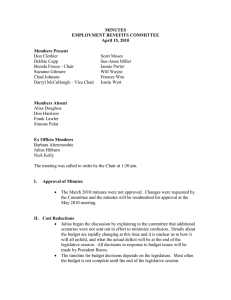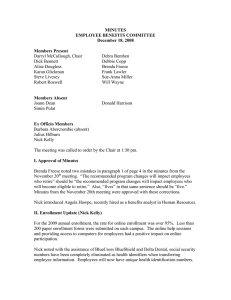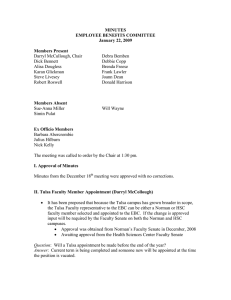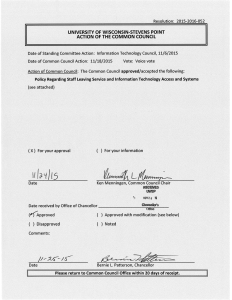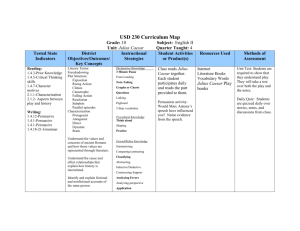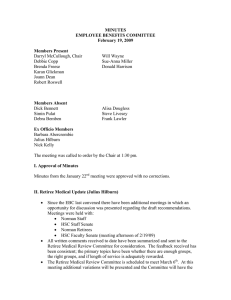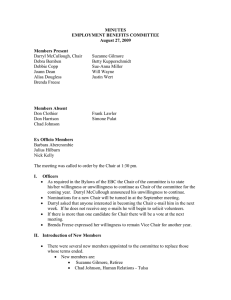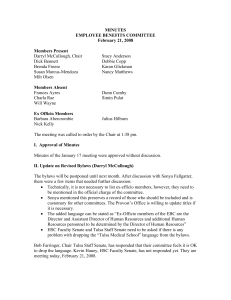Darryl McCullough, Chair Dick Bennett Debbie Copp
advertisement
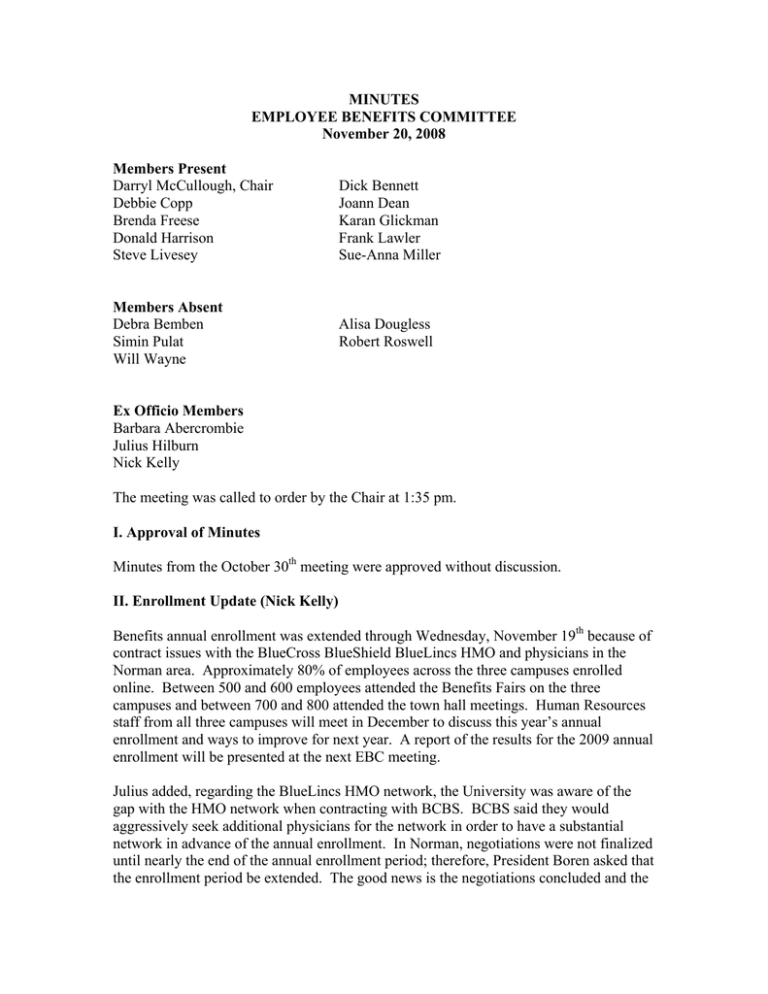
MINUTES EMPLOYEE BENEFITS COMMITTEE November 20, 2008 Members Present Darryl McCullough, Chair Debbie Copp Brenda Freese Donald Harrison Steve Livesey Members Absent Debra Bemben Simin Pulat Will Wayne Dick Bennett Joann Dean Karan Glickman Frank Lawler Sue-Anna Miller Alisa Dougless Robert Roswell Ex Officio Members Barbara Abercrombie Julius Hilburn Nick Kelly The meeting was called to order by the Chair at 1:35 pm. I. Approval of Minutes Minutes from the October 30th meeting were approved without discussion. II. Enrollment Update (Nick Kelly) Benefits annual enrollment was extended through Wednesday, November 19th because of contract issues with the BlueCross BlueShield BlueLincs HMO and physicians in the Norman area. Approximately 80% of employees across the three campuses enrolled online. Between 500 and 600 employees attended the Benefits Fairs on the three campuses and between 700 and 800 attended the town hall meetings. Human Resources staff from all three campuses will meet in December to discuss this year’s annual enrollment and ways to improve for next year. A report of the results for the 2009 annual enrollment will be presented at the next EBC meeting. Julius added, regarding the BlueLincs HMO network, the University was aware of the gap with the HMO network when contracting with BCBS. BCBS said they would aggressively seek additional physicians for the network in order to have a substantial network in advance of the annual enrollment. In Norman, negotiations were not finalized until nearly the end of the annual enrollment period; therefore, President Boren asked that the enrollment period be extended. The good news is the negotiations concluded and the HMO network was extended; unfortunately, it did not happen in as timely a manner as originally hoped. Darryl asked if more physicians are expected to sign on. Nick responded a few more specialists may be added, but the number of primary care doctors will probably not expand. Debbie inquired when the physicians sign on with the HMO network, if they are on the network for the length of the University’s contract with BCBS. Julius stated physicians may drop out of the network at anytime; normally they are required to give at least a 90day notice prior to leaving the network. III. Retiree Medical Report (Julius Hilburn) Julius gave a PowerPoint presentation on the Contribution Strategy and Health Insurance Options Committee’s Review of Retiree Medical Plans Preliminary Findings. The report was released across campus on November 19th. The full report may be found at www.ou.edu/healthcareoptions. The presentation included background on the Committee’s appointment by President Boren. The Committee was appointed in April 2007 in response to significant increases in healthcare costs experienced by the University and plan participants. The Committee was charged with conducting a thorough review of OU healthcare plans and strategies in order to recommend changes which would best meet the needs of active employees, retirees, and the University. Regarding retiree medical, new financial disclosure requirements measure OU postretirement benefits obligations at $589 million. For 2008, the annual cost for insuring the University’s current retirees is about $6 million. It is estimated the annual cost will be around $26 million by 2018. The combination of rapidly increasing retiree medical costs and a significant number of employees reaching eligibility for retirement requires attention and some type of action. The Committee met several times from December 2007 through August 2008 to evaluate current OU retiree medical plans and eligibility requirements and to explore and discuss the competitive practices at other universities and private employers. Julius discussed the issues the Committee agreed to address, as well as the guiding principles used by the Committee during their review of the retiree medical plans. (Both the issues and the guiding principles are discussed on pages 10-11 of the full report.) After a detailed demographic analysis by the Committee, employees and retirees were divided into five groups: Group 1 – current retirees Group 2 – employees currently eligible to retire or eligible before 1/1/2014 or within five years of adoption of changes Group 3 – employees eligible to retire before 1/1/2019 or within 10 years of adoption Group 4 – employees eligible to retiree on or after 1/1/2019 or 10 years from date of adoption or after Group 5 – employees hired on or after 1/1/2008, who currently have access to participate in University health insurance program but will receive no subsidy Eligibility for future retiree medical benefits will be based on when an employee meets requirements, not when they actually leave. Employees should be assured there is no reason to leave the University early to preserve a benefit. Julius stated this point will have to be more clearly communicated, based on feedback already received on the full report. During the presentation, Julius also discussed how the Committee addressed whether or not there should be differences in benefits for current and future retirees. Committee members agreed changes should be limited for those groups of employees less capable of preparing for the financial impact. Also, future changes should be identified and communicated well in advance so those affected can prepare. In addition, some combination of age and service should be used in determining the amount of University financial support for a retiree’s medical coverage. Steve expressed his concern for those employees hired after 1/1/2008 who will no longer have any portion of their benefits paid after retirement, no matter how many years of service they have at the University. Julius stated the Committee recognizes, and has from the inception of this recommendation, the need for an additional review of retiree medical benefits for employees hired on or after 1/1/2008. He mentioned the committee has discussed providing these employees with an opportunity to set aside funds in a taxadvantaged way through a defined contribution plan, to assist with paying for their benefits once they retire. The Committee has recommended a subsequent review of University-sponsored retiree medical insurance benefits for employees hired on or after 1/1/2008. The presentation also included the Committee’s plan design recommendations and changes in contribution strategy (found on pages 16 – 21 of the full report). A change in the method used to coordinate benefits with Medicare is recommended for employees in Groups 3, 4, and 5. Also, an annual deductible of $300 for Medicare-eligible retirees will be added for groups 3, 4, and 5. The recommendations include introducing retiree premiums contributions based on age at benefit commencement and OU service for groups 3, 4, and 5. The financial impact of the Committee’s recommendations will reduce the University’s projected post-retirement benefit obligation by nearly 35%. The recommended program changes will impact employees who will become eligible to retire more than five years after adoption of the changes. Current retirees will not be affected. Therefore, there will be very limited impact on OU annual retiree medical expenditures until around 2020. Julius stated the next steps include conducting town hall and employee governance groups meetings, such as the presentation given for EBC members, during December. Feedback by employees can be provided and recommendations can be made through email at www.ou.edu/healthcareoptions. The Contribution Strategy and Health Insurance Options Committee will meet at least one more time to finalize recommendations after reviewing employee feedback. The final Committee recommendations will be submitted to President Boren in early 2009. Brenda Freese commended Julius and Nick for their work on the Review of Retiree Medical Plans Preliminary Findings report. IV. Update from Human Resources (Julius Hilburn and Nick Kelly) Nick reported, as discussed at the October EBC meeting, letters including a draft of the plan document have been sent to the University’s 403(b) vendors. Signed agreements have been received from nine vendors. Approximately 200 employees across all three campuses will be affected because their vendors will no longer participate in the 403(b) plan. Employees affected will receive personalized emails regarding what steps they will need to take. Nick also provided information regarding the new 403(b) regulations and the companies who will and will not continue as 403(b) vendors. This information will be included in the letter which is sent annually to employees who have 403(b) plans. This letter will be sent to employees the week of November 24th. It was reiterated the major companies will continue to be 403(b) vendors. In response to Steve’s inquiry regarding what an employee can do if their vendor will no longer be a 403(b) vendor, Nick said it is the employee’s choice. If a company in which an employee is investing elects to withdraw, the employee can roll their funds into another plan or invest with another company, or they can choose to leave their money with that company. However, no new money can go to that company after January 1, 2009, if the agreement is not signed by the company. Funds can be transferred to another company at any time. Dick pointed out employees should be advised on how to transfer funds so the transfer is not a taxable event. Julius discussed the University’s search for a master record keeper, a company which would administer OU employee’s defined contribution plan investments. The record keeper would administer the 403(b), 457(b), and 401(a) defined contribution plans. Julius reiterated the University wants a consolidated approach to the administration of the defined contribution plans which would still allow employees significant choice of investment options. The investment options would likely be organized into three tiers. The first tier would be comprised of target date retirement funds. The second tier would be a core group of 10 or 12 investment options that cover different risk/reward categories and would be selected based on their historical performance and fees after review by the University’s investment consultants from RVKuhns. The third tier would include many other mutual fund options offered through a brokerage window for those employees who prefer to make individual investment decisions from a broader range of options. Debbie asked if employees would be allowed to make withdrawals from their defined contribution plans. Julius responded there is no plan to have a loan provision on the 403(b) plan for 1/1/2009. However, loan and hardship withdrawal provisions will be reviewed as the administration of the defined contribution plans are consolidated. Julius stated the consolidation of defined contribution plan record-keeping services would be discussed, along with retiree medical benefits, with the campus governance groups. V. Other Business No new business. The next meeting will be held at 1:30 p.m. Thursday, December 18, 2008. There being no other business, the meeting was adjourned at 3:17 pm.
